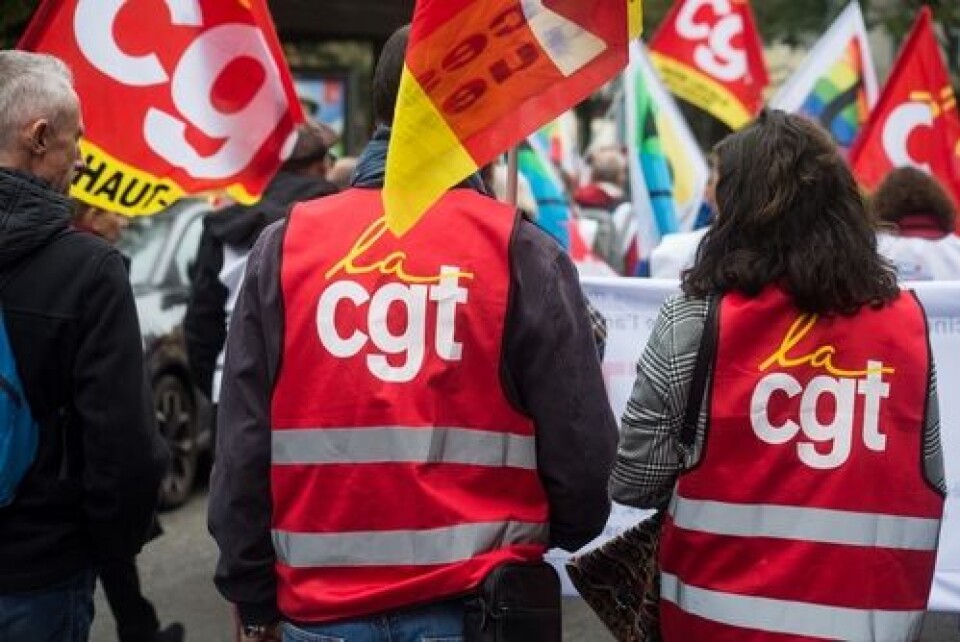-
Warm days ahead: French weekly weather outlook March 31 - April 4
Temperatures of 20C are expected towards the end of the week across France
-
Second runway at Bordeaux airport likely to be renovated not closed
Move may lead to backlash from local people who are unhappy due to the noise levels
-
Pension age reform in France: New poll shows support for a return to age 62
Employers' organisations and trade unions are currently meeting to discuss the subject on the orders of Prime Minister François Bayrou
French fuel shortages: Union calls for wider national strike next week
The interprofessional strike would be a protest against the government’s decision to require some striking refinery employees to go back to work

[Update: October 13 at 16:15 - TotalEnergies has now invited unions to negotiate on salaries from 20:00. Until now the company had said it would only start negotiating when the strikes were lifted. The strike at one Esso-ExxonMobil refinery has also been called off.]
French union has called for a railway strike planned for Tuesday, October 18, to be extended to other sectors in protest against the government’s decision to oblige four striking refinery workers to return to work.
It announced today that strikes at four TotalEnergies refineries and one depot would be renewed along with those taking place at two Esso-ExxonMobil sites.
The CGT has said that the railway strike will “become an interprofessional, national movement for salaries and against the réquisition”, the order sent by the government requiring the Esso-ExxonMobil refinery in Port-Jérôme (Seine-Maritime) to provide a minimum service level.
“Striking is a constitutional right,” the union said, adding that “for the bosses anything is possible [...] and for the employees, it is a question of ‘accept it and shut up’.”
It said that a national strike would help with demands for a “fair distribution of wealth”. A vote will be held today on whether an interprofessional strike will take place.
This has been supported by opposition MPs - with Europe Ecology - The Greens member Sandrine Rousseau, calling for a “general strike” to protest against the government’s response to the issue. La France Insoumise MP Mathilde Panot also went to join strikers at the Port-Jérôme refinery.
The CGT’s Patrick Martinez has said that he understands the “exasperation” which some people in France may be feeling as a result of the strike-related fuel shortages, but that “citizens should not turn against strikers”.
Some employees required to go back to work
Two workers were obliged to return to the Normandy site yesterday (October 12) and two today, according to the energy transition ministry.
Today, it was also announced that the government would initiate a further réquisition in a TotalEnergies depot near Dunkirk, with some workers required to return at 14:00.
This comes as some 30.8% of French petrol stations are experiencing supply shortages, the strike having lasted since September 27. Stations in Hauts-de-France and Ile-de-France are generally more severely affected.
The government cannot order all workers back to work as this would infringe on their right to strike. It is limited to ordering a number which would maintain a minimal service.
A réquisition is considered a controversial move in France with workers’ right to strike held in high esteem and the réquisition seen as a moral infringement on this, if not a legal one.
An exceptional bonus
The CGT is calling for a 10% pay rise for TotalEnergies staff in line with inflation and to better distribute the $10.6billion which the company made in profit in the first half of 2022.
In response to union demands, TotalEnergies has today said in a statement that it will give all of its employees across the world an exceptional bonus “corresponding to one month’s salary” to be paid in December, provided that agreements are reached with employees.
🔴 Devant le refus cette nuit des grévistes CGT de lever partiellement la grève, Total contre-attaque et annonce ce matin le versement d'une prime exceptionnelle à l'ensemble de ses salariés. pic.twitter.com/ijo8aiEpT8
— Maxime Debs (@maxdebs) October 13, 2022
TotalEnergies met with the CGT yesterday to discuss the situation but said that “the conditions were not conducive to organising a negotiation between all the organisations represented at the meeting, the CGT having decided to maintain the blocks” on production.
The company has also said that it could be prepared to “plan a budget for pay rises in 2023 based on the 2022 inflation rate”. This would mean a salary increase of around 6% based on the current rate.
Emmanuel Lépine, a CGT representative, has said: “I do not believe that this will satisfy striking workers asking for a 10% pay rise,” with CGT coordinator Eric Sellini adding: “We don’t negotiate through the media.”
France’s Finance Minister Bruno Le Maire has said that TotalEnergies “must increase salaries.
“They have the capacity, and therefore the duty, to put the wages of all their employees up in the proportion that they negotiate with unions.”
Two unions representing Esso-ExxonMobil workers – the CFDT and the CFE-CGC – reached an agreement with the management for a wage increase of 6.5% in 2023 and a bonus of €3,000.
However, the CGT and the FO have not agreed to this, with the CGT opposed to the fact that a large proportion of the salary increase comes from a bonus rather than a boost to basic pay.
President Emmanuel Macron said during an interview on France 2 last night that he estimated that petrol station supplies could return to normal over the next week or 10 days.
Read more: Around a week for French fuel shortages to end, Macron estimates
TotalEnergies’ Jean-Marc Durand told BFMTV on Monday that the refineries would need “a good week” to get back to their normal productivity levels after the strikes come to an end.
Related articles
French fuel shortages: Which professionals are being prioritised?
French fuel shortage: How to check stocks at your local petrol station
French fuel shortages: When might supplies return to normal?
























